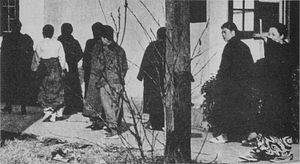According to a statement by government spokesman Yoshihide Suga on Thursday, the Japanese government asked the United Nations to partially retract an old United Nations report detailing abuses against Korean and other women who were forced to work as “comfort women” during the Second World War. The government’s request was rejected by the report’s author. The revelation comes amid a broader trend in Japan where conservative politicians have challenged the veracity of international claims regarding how the Imperial Japanese Army treated women in Korea and elsewhere during the war. Suga did not specify what sections of the report were in question.
The report, authored by former U.N. special rapporteur Radhika Coomaraswamy in 1996, called on Japan to apologize to the victims and pay reparations to survivors who had been forced into sex slavery during the war. The report was authored after Japan’s Chief Cabinet Secretary Yohei Kono issued a statement in 1993 sharing the conclusions of a Japanese government study that declared that the Imperial Japanese Army was culpable of forcing women — mostly Koreans and Chinese — into sexual slavery. Kono’s statement included an apology and has been under criticism by some Japanese conservatives. For example, current Japanese Prime Minister Shinzo Abe, during his first term in 2007, stated that he did not believe that the women were necessarily forced into sexual slavery, sparking controversy at the time. Though Abe has recently been less willing to explicitly contradict the Kono statement, remarks from within the ruling Liberal Democratic Party suggest that the Kono statement could be amended in the future. That his administration would now try to revise the U.N. special rapporteurs’ report is evidence that Abe’s government is likely pandering to a small but considerably influential conservative political base in Japan.
South Korea condemned the Japanese government’s attempt to revise the report. Noh Kwang-il, spokesman for the South Korean Foreign Ministry, remarked, “However hard the Japanese government tries to distort the true nature of the comfort women issue and play down or hide the past wrongdoings, it will never be able to whitewash history.” The domestic debate on the issue in Japan was transformed this summer when the Asahi Shimbun newspaper, a left-leaning publication, issued a retraction of several articles it had published on the issue of sex slavery by the Imperial Japanese Army that were based on a discredited source. Japanese conservatives took this to vindicate their apprehension about the international consensus on the issue. Despite the Asahi Shimbun‘s retraction, the testimonies of numerous survivors of sexual slavery under the Imperial Japanese Army — particularly South Korean survivors — continue to resonate in the region.
Historical issues are a particular inhibitor to closer ties between Northeast Asian states. In particular, relations between South Korea and Japan have been chilly ever since Shinzo Abe returned to power in December 2012. South Korea continues to demand that Japan resolve the “comfort women” issue “effectively and in a way that is agreeable to the living victims.” Issues like historical revisionism on the comfort women issue are non-negotiable for the South Korean government. Beyond the government, public opinion of Japan, particularly the government under Abe, is at historic lows in South Korea.
































